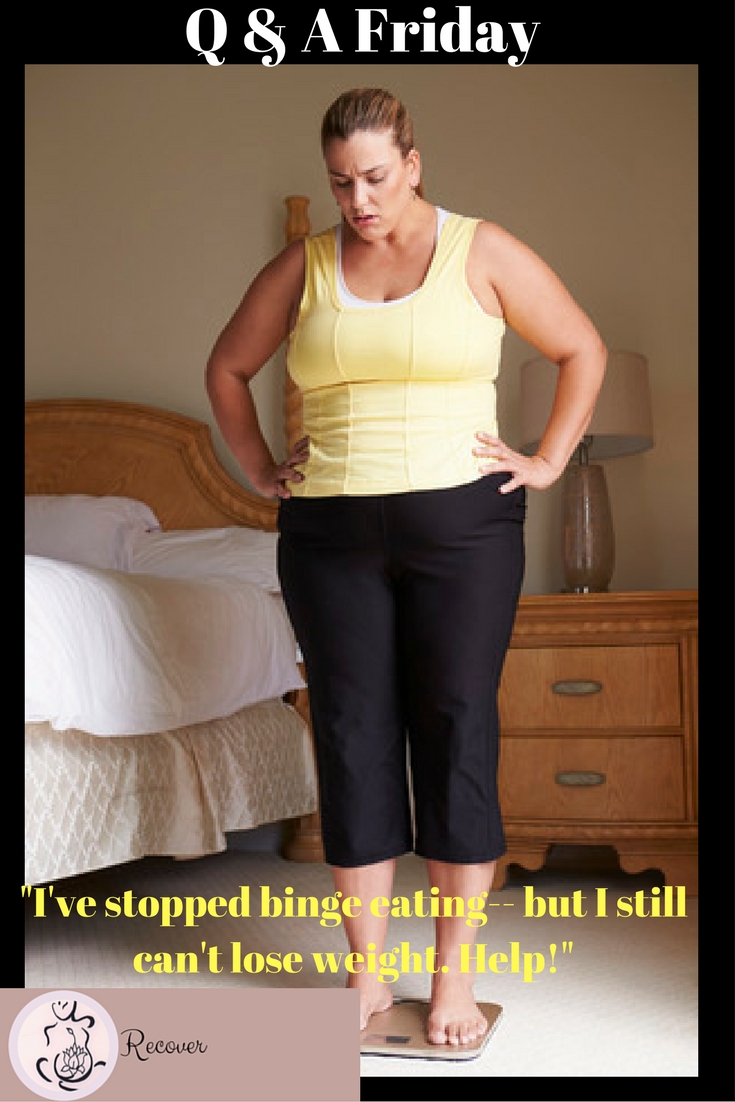 Today’s question comes to us from Pamela in New Jersey. This is a super common and difficult question that comes quite often in ED recovery.
Today’s question comes to us from Pamela in New Jersey. This is a super common and difficult question that comes quite often in ED recovery.
Question –
Hi Leora,
I have an ED therapist and ED nutritionist and I’ve been seeing them for over a year. I’m also in a weekly ED recovery group.
I think I’m doing good with recovery but I’m not losing weight. I think it’s because I’m still eating to take the edge off. Not in a binge sort of way but in a starting point sort of way. I’ve been paying more attention to using the hunger scale recently and that’s improving. Not losing anything since starting a serious recovery program is very discouraging. I’m no small fry, I’m over 300 pounds. I have very low energy and still sleep quite a bit which makes sense considering my body is very large. Everyone in recovery says it’s not about the weight. It’s about healing the behaviors and the weight I suppose will come off eventually. I’ve found a lot of peace but it’s not easy being so large.
When I bring up weight loss to my ED nutritionist she say’s that should be on the back burner for now. However even after all the progress and peace I am discouraged and down mood wise. My poor body has endured much with the BED. I’m getting up there in years now (55yo) and it’s not getting easier carrying the extra weight. I understand the goal isn’t to “lose” weight but to find more normalized behaviors around food and resolve the need for emotional eating.
But i am tired, I am feeling low and today I’m discouraged. I’ve done a good job not making about the weight over almost the past two years and weight wise I’ve let go of 10 pounds or so. When do I let it go of the big excess weight. I know you cant tell me but there must be a way to combine releasing extra weight with recovery even if it is some form of a “diet”. There has got to be a way to gain physical health and normalized eating together. I have no illusion of being super small, I think I have a very real thought of what my body is comfortable size/weight wise. But when I bring it up I am told that losing weight cant be the focus. But that doesn’t change that it’s just to hard and humiliating carrying this extra 150 pounds. Yes Humiliating at times when I cant sit at a table at a restaurant for example, or cant sit on someone’s couch bc it wont hold me. I’m in pain emotionally and physically over this weight issue and I need someone with some direction other than put it on the back burner.
I’m asking you bc whenever I read what you have to say you make sense.
Any thoughts? Thank you Leora,
Answer-
Your question is such a good one. As long as I have been working in Eating Disorder Recovery, this conundrum has come up on an almost daily basis. People either start to gain weight in their recovery and it’s very upsetting for them, or they find that they have been not bingeing, not purging, no restricting, and not dieting — but they have not lost any weight. They then become extremely discouraged and also very angry.
The anger is usually directed at recovery or at their recovery team. They wonder why they’ve wasted all this time not on a diet when they could have been on a diet and lost weight rather than what they’re doing right now.
My friend Sheira, who is a well known eating disorder therapist often says, “when you focus on weight loss, you make a pact with the devil.” As an Eating Disorder Therapist, when you promise anyone that you will help them lose weight or you focus on weight loss with them, you begin corroborating with the societal message that got them into their Eating Disorder to begin with. The very first thing we need to do with someone who is recovering from an eating disorder is to help them take their focus off of food and weight and the scale and diets and weight loss and help them to refocus on their mental and physical health. Dieting and the pursuit of weight loss does not equal health. The problem is that we have been told that it does– not only does weight loss equal health, it also equals beauty and it equals our worth in the world. I remember an interview many, many years back with Duff (she was one of the first MTV Vee-Jays). She was a model and model thin– and then she became ill. While going through multiple chemotherapy treatments she became really skinny, sick skinny– and people started complimenting her on her weight loss and saying things like, “whatever you’re doing- keep it up! You look great!” She was appalled. She was already super thin and then she was sick. Skinny culture is not about health. This is why we don’t focus on weight loss in ED recovery. We focus on health. And sometimes health means weight gain while focusing on mental health recovery.
This is a super common argument that occurs when the Eating Disorder Community gets into a room with the Obesity Awareness community. When we go to Eating Disorders conferences, there are always inevitably lots of folks from the Obesity recovery community. The obesity researchers look at weight loss while the ED recovery community feels that the goal of weight loss most often ends in an eating disorder for the ED population, so treat the eating disorder and weight will come to its natural place. The belief is that concentrating on weight loss will bring you back to a place of obsessing on the scale, feeling like a failure and then reverting to eating disorder ways. In ED recovery, we want to treat your brain first and help you to find a place of peace. We believe that your healthy body will come concurrently with a healthy mind.
This argument however does not really fly when people feel that their weight is negatively impacting their lives. People tend to interject society’s negative connotations of their weight with their own feelings about how wrong they are and feel in the world. The answer is to address the problem that you’re dealing with, not the weight. For instance– pre-diabetes. The recommendations for reversing pre-diabetes includes eating healthy food and exercising 30 minutes a day. Exercise does not have to be pejorative or punishing or painful. It can be a walk with your kiddos around the neighborhood, it can be swimming, it can be a yoga video, it can be jumping on a trampoline. Pre-diabetes is having an elevated blood glucose level and can be helped by exercise because when you utilize your muscles they will pull glucose out of your blood for energy and stamina. And healthy eating doesn’t have to be a diet determined by someone outside of you. Healthy eating includes eating lots of whole unprocessed foods when you’re hungry and stopping when you’re body is satisfied and allowing yourself to eat foods for enjoyment (like ice cream!) in a non-bingeing and loving way.
Having no energy is something that you can work on as well. People of all shapes and sizes (especially women) feel that they have no energy. Ways to increase your energy again include getting 7-9 hours of sleep each night, exercising and eating for both health and enjoyment. If you are able to eat when you are hungry, stop when you are satisfied and incorporate loving, healthy movement into your daily routine– your body WILL come to its healthy weight without you focusing on weight loss as the goal. Try to shift your focus instead on personal health and inner peace.
According to Deb Burgard of The Association for Size Diversity and Health, (The Health at Every Size movement) “…advocates eating in a manner that balances individual nutritional needs with hunger, satiety, appetite, and pleasure. We also enthusiastically support individually appropriate, enjoyable, life enhancing physical activity rather than exercise for the purpose of weight loss. A “normal weight” is the weight at which a person’s body settles as s/he moves towards a more fulfilling, meaningful lifestyle that includes being physically active and consuming nutritious foods. Not all people are currently at their most “healthy weight.” Movement towards a more balanced life will facilitate the achievement of a “healthy weight.” “
When my clients ask about weight loss, we try to look and see what they think weight loss will offer them. Often answers vary from things like: Losing weight will give me: more friends, more confidence, more energy, more love, the ability to go out and do things that I’ve been missing, I can wear whatever I want… The truth is, you can reverse engineer this. Don’t think about losing weight as the antidote to the issues. When you look to treat each issue individually, you wind up finding the benefits that you think weight loss will give you. Chasing the almighty number on the scale– for someone who has been in that rat race for a number of years, will only keep them in it. Chase true health instead.
What do you think? Does it makes sense?
For further reading on the topic, go to:
National Eating Disorder Association Thoughts on The Health at Every Size Approach
I hope that this response was helpful for you. Do you have a question about binge eating, bulimia, anorexia, or anything associated with eating? Send an email to bingeeatingtherapy at gmail dot com. All questions will be kept confidential. Include your first name or the name you want to be referred to as and your location. Are you interested in online therapy or coaching to deal with your eating disorder? Please contact me to discuss getting started.
Online Binge Eating Treatment - LEARN MORE!
EVIDENCE BASED INTERVENTIONS THAT REWIRE YOUR BRAIN TO:
-
STOP BINGE EATING
-
AUTOMATICALLY MAKE HEALTHY CHOICES
-
GAIN A FEELING OF PEACE AND CALMNESS IN YOUR BODY
-
RECOVER FROM BINGE EATING FOR GOOD



 Follow
Follow
